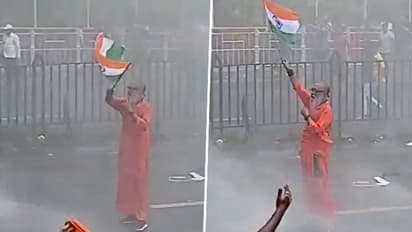Kolkata horror: Should Mamata resign as WB CM? Nabanna Abhijan Sadhu says, 'even Hitler, Stalin had to leave'

Synopsis
Balram Basu, a saffron-clad sadhu captured the public's attention after a powerful video of him standing resolutely in front of water cannons while waving the Indian tricolor during 'Nabanna Abhijan' rally surfaced online. But what motivated him to join the protest at his age? What are his demands and perspectives on the state of Bengal? What he thinks if West Bengal Chief Minister Mamata Banerjee should resign? Read on to the full story to find out.
In a striking display of defiance, Balram Basu, a saffron-clad sadhu and photography professor, has become a national symbol of resistance against alleged injustices in West Bengal. The professor, who has transitioned from electronics engineering to a life of spirituality and teaching, captured the public's attention after a powerful video of him standing resolutely in front of water cannons while waving the Indian tricolor during 'Nabanna Abhijan' rally surfaced online.
Mamata Banerjee-led West Bengal government, has faced severe backlash following the brutal rape and murder of a trainee female doctor at Kolkata’s RG Kar Medical College. The incident has ignited widespread outrage and a clarion call for justice and accountability. The student group 'Paschim Banga Chhatra Samaj' and the dissident platform ‘Sangrami Joutha Mancha’ organized a significant protest march called ‘Nabanna Abhijan’ on August 27, targeting the state secretariat, demanding the Chief Minister’s resignation.
Amid the chaos, a viral video showed Balram Basu standing firm before water cannons, holding the tricolor and challenging the police with a provocative demand. "If you cannot protect the citizens, wear bangles,” he declared.
Sadhu in Nabanna Abhijan demands safety of daughters
In an exclusive interview with Organiser on August 28, Basu, who has embraced a sanyasi lifestyle after a career in electronics and photography, elaborated on his motivations and views.
Basu expressed profound sorrow over the deteriorating law and order situation in Bengal, especially concerning crimes against women. “It is very sad that such things are happening with our daughters, especially in the Bengali samaj where we worship Shakti. Maa Durga Puja is coming, but we are engulfed in this… look at the ‘atyachar’ happening here,” he said, lamenting the contrast between societal values and current realities.
The professor, who has taken guru deeksha at age 12 and lives by the stages of Sanatan Dharma, underscored the need for a societal shift. “The samaj which will not worship nari will go extinct very soon; it is bound to die. No god resides in a place where women are not treated well,” he asserted.
Addressing the fact that Bengal is governed by a woman Chief Minister, Basu criticized the government's inadequate response to crimes against women.
“She may be a woman, but if those in power only speak about women and don’t take the right actions to protect their dignity, then there is no point,” Basu remarked.
Despite facing mockery for his age and involvement in a student-led protest, Basu remained resolute. “This is not about being a hero or a student. Let them label me however they wish. The larger issue here is that our daughters are no longer safe. Every person should stand by the truth and uphold their dharma. This isn’t about politics or taking sides; it’s about the protection of our daughters, that’s all.”
Sadhu on why he joined the Kolkata protest
Basu's decision to join the protest, despite it being led by students, was driven by a sense of collective responsibility.
“In Bengal, girls and women are facing horrific crimes one after the other—their ‘Chirharan’ (humiliation) is happening repeatedly, and there’s no positive action from the administration. People don’t know what the government is doing, and that’s why, alongside students, many like me—teachers, professionals, and others—joined the movement,” he explained in the interview with Organiser.
Basu even highlighted issues related to the state's extensive border with Bangladesh. “Bengal is a border state that shares around 2,200 km of border with Bangladesh,” he noted, pointing out the political exploitation of issues like infiltration and illegal trade.
Basu also voiced concerns over the erosion of Bengali Hindu cultural identity and the lack of representation for cultural voices. “Those who used to think about Hindu culture—be it poets, columnists, thinkers, or others—they have surely declined but not to that extent. They are still there but lost and hidden. They don’t get representation, their voices are not heard,” he said.
On Mamata Banerjee's resignation, Sadhu says...
With increasing calls for President’s rule and Bengal Chief Minister Mamata Banerjee’s resignation, Basu offered a historical perspective on governance.
“Look, whether any government runs or not depends on whether it is choosing the right path. If any government does not follow the right path, they will have to go by default—they will be replaced. History has been this only, and it speaks for itself. Leaders like Lenin, Stalin, or Hitler—everyone had to leave at some point. So those who are right will rise, and we are asking for the same only,” he concluded.
Stay updated with the Breaking News Today and Latest News from across India and around the world. Get real-time updates, in-depth analysis, and comprehensive coverage of India News, World News, Indian Defence News, Kerala News, and Karnataka News. From politics to current affairs, follow every major story as it unfolds. Get real-time updates from IMD on major cities weather forecasts, including Rain alerts, Cyclone warnings, and temperature trends. Download the Asianet News Official App from the Android Play Store and iPhone App Store for accurate and timely news updates anytime, anywhere.